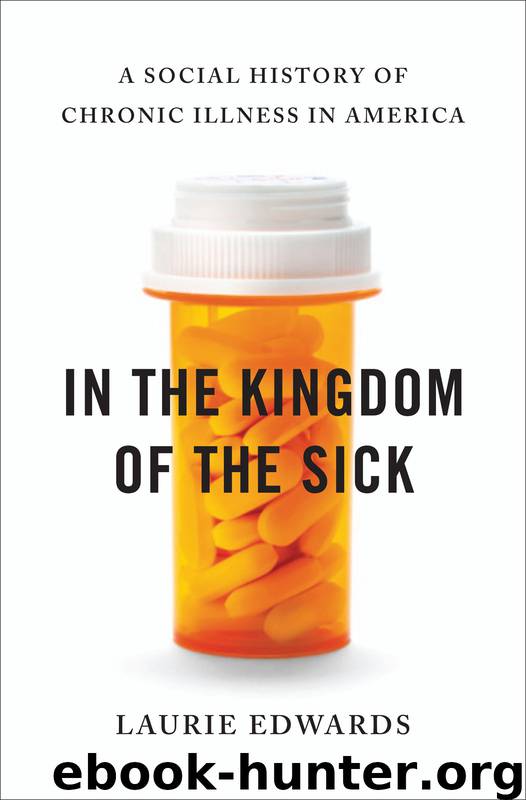In the Kingdom of the Sick by Laurie Edwards

Author:Laurie Edwards
Language: eng
Format: epub
Publisher: Walker Books
Published: 2013-09-07T16:00:00+00:00
Toward an Answer: Pain in the Twenty-First Century
Like so many mythologies surrounding illness, the mythology of women in pain that has subsisted for so long exists in part because mystery still surrounds it. Pain and gender are irrevocably linked, so it is natural that addressing pain in an effective, comprehensive manner involves looking at the differences between the sexes.
“I’m an optimist by nature, but I believe there’s evidence to support a hopeful outlook. The gains which will come soonest—which actually are occurring as we speak—are advances in the understanding and treatment of pain, regardless of gender,” says Dr. Whitman. “One which will be crucial is a better biological understanding of pain—viewing it as a medical disease, rather than a psychological weakness. Because women are disproportionately affected by pain, this will benefit them the most.
“[Fibromyalgia] is one disorder where we’ve made recent progress. We have great studies using fMRI [functional MRI], which show that the brains of patients with FM react differently to painful stimuli, which points back again to biology. And Lyrica is a medication shown to be helpful in nerve pain, which supports newer thinking about FM being a nerve pain disorder,” Whitman says. Continued research into the biological processes of diseases, including the role of hormonal fluctuations in the manifestation and perception of pain in women, are important on many levels, including treatment, quality of life, and patient validation and identity. The road is fraught with misfires and wrong turns, however. For example, in 2009, researchers thought they had isolated a virus (XMRV retrovirus) believed to be involved in chronic fatigue syndrome, but by 2011, a more comprehensive study disproved the association between the virus and the condition.22 That same year, Science fully retracted an article that linked XMRV to chronic fatigue syndrome, due to contamination of blood samples and misrepresentation of data.23
A diverse and expanding body of research conducted in the 1990s found sex-based differences in risk of disease, progression of disease, responses to treatments for diseases, and overall outcomes of disease.24 The focus intensified in 2001, when a groundbreaking report was published by the Institute of Medicine at the behest of the Society for Women’s Health Research. The IOM study stated that studying sex differences could yield significant improvements in the health and lives of men and women, that research on sex differences should be conducted at every level in the body and at every stage of life, and that the research on sex differences should also include studying how men and women respond to medications.25
Why does sex matter so much, especially when it comes to disease and medication? For one thing, experts explain that sex is “both a phenotype and a genetically based bio-marker that may predict disease susceptibility, onset and severity or response to therapy.”26 We see this in terms of how many more women experience chronic pain and chronic pain conditions; but another example of this is cardiovascular disease, which affects both men and women but in men causes twice as many deaths.27
Download
This site does not store any files on its server. We only index and link to content provided by other sites. Please contact the content providers to delete copyright contents if any and email us, we'll remove relevant links or contents immediately.
Good by S. Walden(2930)
The Social Psychology of Inequality by Unknown(2332)
0041152001443424520 .pdf by Unknown(2241)
The Checklist Manifesto by Atul Gawande(2222)
The Meaning of the Library by unknow(2082)
23:27 by H. L. Roberts(1899)
Guns, Germs and Steel by Diamond Jared(1898)
Being Mortal: Medicine and What Matters in the End by Atul Gawande(1817)
Borders by unknow(1798)
A Leg to Stand On by Oliver Sacks(1720)
The Hot Zone by Richard Preston(1648)
And the Band Played On by Randy Shilts(1632)
The Valachi Papers by Peter Maas(1523)
The Obesity Epidemic by Robyn Toomath(1433)
The Laws of Medicine by Siddhartha Mukherjee(1424)
The Andromeda Strain by Michael Crichton(1374)
The Plague and I by Betty Macdonald(1272)
Pharmacy Practice and The Law by Richard Abood(1262)
Autism's False Prophets by Paul A. Offit(1249)
